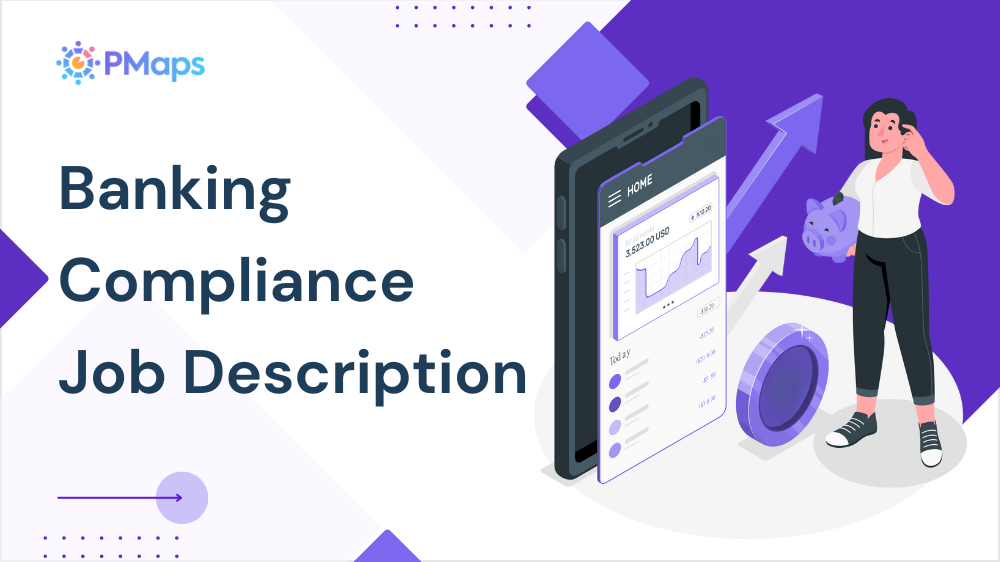
A compliance function defines the rhythm of responsible banking. This banking compliance job description outlines a role centered on regulatory alignment, process oversight, and internal policy enforcement across financial services. Every detail reviewed, every control applied, serves the integrity of the institution.
The bank compliance officer ensures procedures remain current with evolving norms, documentation meets audit standards, and operational risks are identified early. This role works closely with finance, operations, and senior management—maintaining systems that enable accountability across every transaction.
Banking Compliance Officer Roles & Responsibilities
This role monitors internal practices, regulatory guidelines, and risk indicators. The responsibilities below outline how compliance officers uphold control, ensure documentation readiness, and align banking functions with legal and institutional standards.
- Regulatory Tracking: Monitor changes to RBI, SEBI, and other financial authority guidelines; initiate internal updates.
- Policy Enforcement: Ensure adherence to internal compliance frameworks, operational manuals, and standard procedures.
- Audit Coordination: Prepare documentation for statutory, internal, and external audits; manage audit queries.
- Risk Assessment: Identify procedural gaps, assess compliance risk areas, and recommend mitigation measures.
- Training Oversight: Conduct internal awareness programs for teams on new or revised compliance requirements.
- Documentation Review: Vet loan files, transaction logs, KYC records, and other client-related documentation.
- Reporting: Generate compliance reports, MIS summaries, and dashboards for senior leadership.
- Regulatory Liaison: Communicate with regulators and industry bodies during audits or inspections.
- Incident Escalation: Report breaches or deviations from approved procedures as per escalation matrix.
Objective of the Banking Compliance Officer Role
The role of a compliance officer is grounded in operational clarity and procedural control. It ensures that every banking activity is supported by a system of internal checks aligned with regulatory expectations and risk mitigation protocols.
- Maintain continuous alignment between internal procedures and regulatory mandates.
- Build audit readiness into day-to-day documentation and reporting practices.
- Strengthen oversight by identifying compliance gaps and supporting resolution mechanisms.
- Support teams with updated guidelines, reporting frameworks, and policy revisions.
- Sustain institutional discipline through control-based decision environments.
Additional Tip: Institutions using compliance assessments report 31% fewer audit deviations (Deloitte). Use our Banking Compliance Assessment to identify candidates with regulatory fluency and procedural precision.
Qualification and Skill Requirements for Banking Compliance Roles
This role requires consistent familiarity with financial regulations, operational controls, and internal reporting. The qualifications outlined below are aligned with the daily responsibilities of professionals tasked with safeguarding institutional compliance.
- Educational Background: Bachelor’s or Master’s degree in Law, Commerce, Finance, or related fields; compliance certifications preferred.
- Experience: 3–6 years in banking, NBFC, or regulatory compliance roles.
- Regulatory Knowledge: Familiarity with RBI, SEBI, AML, KYC, FEMA, and other financial compliance standards.
- Documentation Skills: Attention to detail in reviewing internal forms, loan records, and reporting files.
- Audit Readiness: Understanding of audit cycles, documentation formats, and query handling.
- Policy Understanding: Ability to interpret and apply compliance frameworks within operational units.
- Communication: Strong written and verbal skills for reporting, training, and regulatory coordination.
- Tech Tools: Working knowledge of compliance monitoring tools, risk dashboards, and internal control systems.
Perks and Benefits of the Banking Compliance Role
Compliance functions offer career stability, institutional visibility, and domain specialization. These benefits are designed to attract professionals who value policy precision, cross-functional involvement, and long-term growth in regulated financial environments.
- Process Ownership: Direct involvement in compliance frameworks, reporting cycles, and audit preparation.
- Regulatory Access: Exposure to real-time updates from RBI, SEBI, and other statutory bodies.
- Career Mobility: Growth pathways to Compliance Manager, Risk Officer, or Internal Auditor roles.
- Learning Opportunities: Access to certifications in AML, KYC, and governance compliance.
- Structured Progression: Role stability with well-defined review, promotion, and evaluation systems.
- Cross-Departmental Collaboration: Work with legal, operations, credit, and senior management regularly.
- Recognition Value: High trust role acknowledged during audit outcomes, inspections, and policy revisions.
Tips for Employers to Craft an Effective Banking Compliance JD
A precise banking compliance job description reflects the procedural weight of the role. These tips help ensure clarity for applicants while reinforcing the technical and institutional expectations tied to compliance governance.
- Clarify Reporting Lines: Indicate if the role reports to risk, legal, or directly into finance leadership.
- List Regulatory Domains: Specify which areas the role will oversee—KYC, AML, lending compliance, or reporting.
- Define Policy Scope: Mention involvement in drafting, updating, or enforcing internal control documents.
- Mention Tools Used: Include systems like compliance monitoring software, audit trackers, or regulatory dashboards.
- State Cross-Functional Links: Identify regular coordination with legal, credit, audit, or business teams.
- Indicate Audit Involvement: Clarify if the role manages audit prep, query resolution, or post-audit response actions.
Exclusive Offer: Structured compliance interviews improve policy adherence by 34% (PwC). Use our Banking Compliance Interview Bank to evaluate risk interpretation, regulatory familiarity, and audit preparedness.








